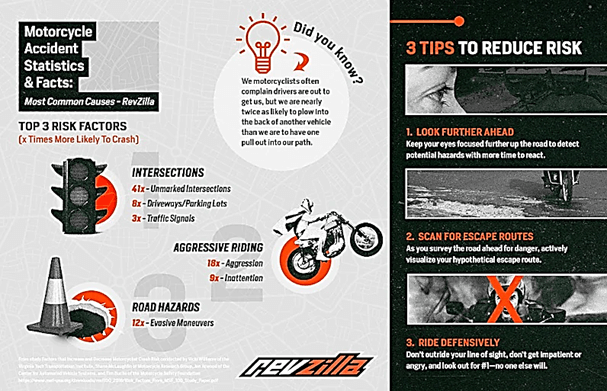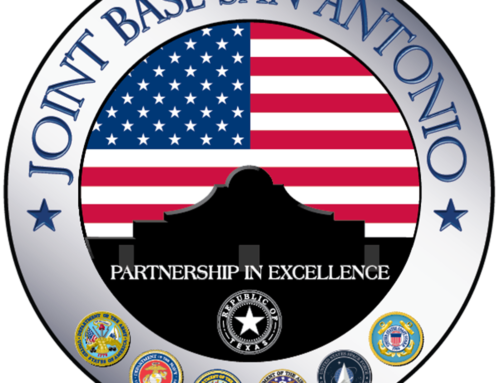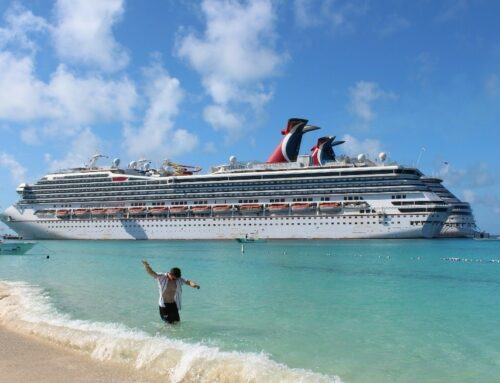It’s Motorcycle Safety Awareness Month!
Why Do Motorcycles Crash?
Surprising Facts about Motorcycle Riding Safety
May is Motorcycle Safety Month!
 Motorcycle crashes are frequently catastrophic to all road users, affecting the safety and well-being of riders and road users. To better understand the causes and prevention of motorcycle crashes, the Virginia Tech Transportation Institute (VTTI) conducted a comprehensive study for the Motorcycle Safety Foundation (MSF) using video cameras and data loggers on selected motorcyclists over the course of four years.
Motorcycle crashes are frequently catastrophic to all road users, affecting the safety and well-being of riders and road users. To better understand the causes and prevention of motorcycle crashes, the Virginia Tech Transportation Institute (VTTI) conducted a comprehensive study for the Motorcycle Safety Foundation (MSF) using video cameras and data loggers on selected motorcyclists over the course of four years.
The study collected 366,667 miles of real-world riding data (for a total of 100.6 years of riding time!) from riders of different ages, genders, experience levels and locations. The data included 30 crashes and 122 near-crash events that were analyzed to identify the factors and behaviors that contributed to the incidents.
Here are some of the key findings and implications of the study:
- Intersections are dangerous. About half of the crashes and near-crashes occurred at intersections, mostly involving another vehicle violating the motorcycle’s right-of-way. Riders should be alert and prepared to react when approaching intersections, and use strategies such as lane positioning, speed adjustment and eye contact to increase their visibility and communication with other drivers.
- Rear-end collisions are common. About one-third of the crashes and near-crashes involved the motorcycle hitting or being hit by another vehicle from behind. Riders should maintain a safe following distance, use both brakes to stop smoothly and effectively, and check their mirrors and blind spots before changing lanes or stopping.
- Turning corners can be challenging. About one-fourth of the crashes and near-crashes involved the motorcycle losing control while cornering, especially on right curves. Riders should look through the curve, lean with the motorcycle, and avoid braking or accelerating abruptly while turning corners. Riders also should be aware of road conditions, such as gravel, sand, wet pavement or debris that can affect traction.
- Tip-overs are frequent. About 40% of the crashes and 20% of the near-crashes involved the motorcycle tipping over, usually at low speeds or while stopped. Riders should practice low-speed maneuvers, use the friction zone and rear brake to control speed, and maintain balance and stability while stopping or parking.
- Rider behavior matters. The study found that rider factors such as attention, judgment, decision making, skill, fatigue, impairment, aggression and risk-taking played a role in many of the crashes and near-crashes. Riders always should wear protective gear, avoid distractions, alcohol and drugs, obey traffic laws, ride within their limits, and seek continuous training and education to improve their riding skills.
The study also provided valuable insights for motorcycle manufacturers, road designers, law enforcement agencies, policy makers and researchers on how to improve motorcycle safety through engineering, infrastructure, enforcement and education interventions.

The VTTI study is one of the most comprehensive and innovative motorcycle crash studies ever conducted in the U.S., providing a wealth of data and analysis that can help reduce motorcycle crashes and save lives. The study also highlights the need for more research on motorcycle safety issues using naturalistic methods that capture real-world riding situations.
To learn more about the study and its findings, you can visit the VTTI website or read the reports that contributed to the study here. You also can check out some tips and resources from MSF on how to be a safer rider here.
We at the Herd Law Firm, PLLC, are drivers and motorcycle riders, too! We support divers, bikers and motorcyclists injured on the road, and have successfully represented such victims seeking the assistance and compensation they so need and deserve.
5/31/2023
Sources:
- https://www.revzilla.com/common-tread/what-virginia-tech-learned-about-how-and-why-we-crash-our-motorcycles
- https://motorcycle.vtti.vt.edu/
- https://cyclevin.com/virginia-tech-motorcycle-crash-study-results/
- https://www.hdforums.com/how-tos/slideshows/10-things-learned-from-the-virginia-tech-bike-crash-study-468635








